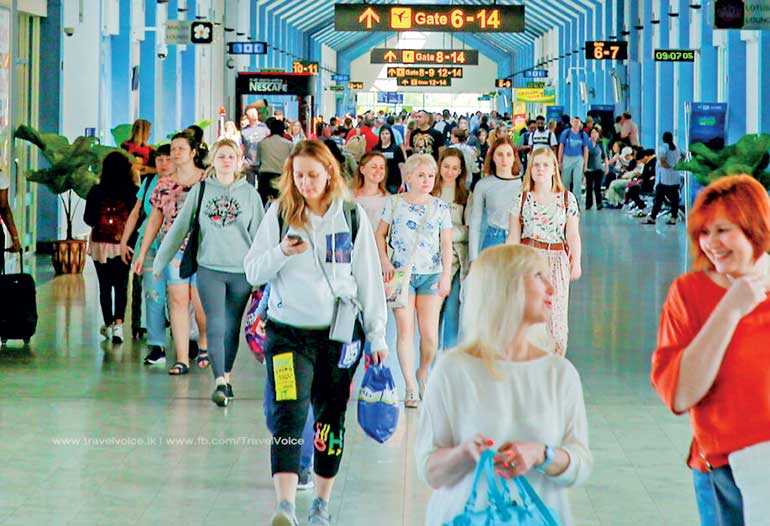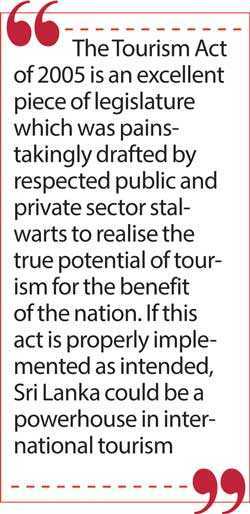Thursday Feb 26, 2026
Thursday Feb 26, 2026
Tuesday, 20 April 2021 00:09 - - {{hitsCtrl.values.hits}}

The need of the hour is to implement the Tourism Act as intended and in doing so improvements can easily made with consensus without reinventing the wheel
 There is much talk about a new Tourism Act being introduced by the tourism authorities. Sadly, this seems to be dividing the industry at a crucial moment due to lack of proper consultation and consensus.
There is much talk about a new Tourism Act being introduced by the tourism authorities. Sadly, this seems to be dividing the industry at a crucial moment due to lack of proper consultation and consensus.
It is my considered opinion the new Act will be a major distraction, waste of time and be extremely detrimental to the industry as well as Sri Lankans at large who have been denied the benefits of Tourism for so long.
As we have seen in Sri Lanka, constitutions and Acts hurried through in secrecy without due consultation or consensus will only serve self-interest of narrow-minded individuals and facilitate corruption at the expense of the industry and the population at large.
The first question to be asked is, who requested a new Act and why was it initiated in the first place?
The Tourism Act of 2005 is an excellent piece of legislature which was painstakingly drafted by respected public and private sector stalwarts to realise the true potential of tourism for the benefit of the nation. If this act is properly implemented as intended, Sri Lanka could be a powerhouse in international tourism and join other successful destinations in Asia such as Thailand, Singapore, Malaysia, etc. in generating much needed foreign exchange, jobs and taking development to rural areas.
Tourism clearly has the potential to be the no. 1 economic activity in Sri Lanka. In my opinion the need of the hour is to implement the Tourism Act as intended and in doing so improvements can easily made with consensus without reinventing the wheel. Let me allude to some of the major benefits of the current Act that will be lost if the Act is repelled.
Horses for courses
Tourism is a highly competitive business with many destinations competing fiercely for their share of the pie. Hence it is important we have the right professionals heading the various boards for each segment as in the 2005 Act. If the back offices need to be combined this can easily be done without resorting to a new Act. Cost saving is a flimsy argument – the more important issue is to have the right professionals who understand international tourism and have a vision to drive the industry.
Right balance on boards
Each of the boards are represented with the correct balance with private and public sector in the current Act. Commercial activities such as promotion has a slight tilt towards the private sector whist the regulatory functions have predominantly public sector members. This provides the perfect mechanism for the public and private sectors to work together in tandem. As the private sector members are nominated by the apex associations, they represent the membership and are responsible to them. Importantly they are not appointed at the whims and fancies of politicians or officials.
 Independent funding
Independent funding
This has been a perennial problem and the reason Sri Lanka lags in promoting the destination effectively. With the current Act, the private sector has come up with a mechanism to fund promotions without depending on Government handouts. It is the private sector that has the knowledge and experience to conduct effective promotions. Hence the current Act provides the ability to do this effectively with the public sector without some of the constraints of Government departments.
Overregulation
Tourism is a highly deregulated industry internationally. It is no secret tourism investments in Sri Lanka are almost entirely from the private sector and the industry has been sustained through many difficult years by the private sector. The role of the public sector is to set the right policy framework. The current Act provides for policy/regulations to be set in consultation with the private sector and avoid the risk of overregulating.
Unity
Prior to drafting of the Tourism Act of 2005 the Secretary to Tourism at the time very wisely counselled the industry to unite and come up with one voice so politicians and officials do not divide and rule to further their end. This was a Herculean task to bring a fractured industry under two umbrella associations – THASL and SLATO – which eventually formed a joint council to work on the Act so it had consensus and the approval of the entire industry. It would be a travesty if this is compromised to further the interest of a few.
At this juncture when the global tourism industry is in jeopardy, most countries are diligently working on a recovery plan and strategising on how to succeed in the post pandemic world. Sri Lanka seems to be the only country in the world obsessed with an unnecessary new Act.
What is important is the integrity of the officials to implement the current act properly and not distract industry professionals from working collectively to strategise a way forward. The post pandemic world will bring seismic challenges and opportunities. Hence, we need the best tourism professionals in the county to be fully switched on to the task to steer the industry to a rapid path of growth to realise the true potential of tourism for the nation.
(The writer was President of SLAITO when the Tourism Act of 2005 was drafted and worked with industry peers in the private and public sector to finalise the Act. He was also Managing Director of Aitken Spence Travels and has served on the Board of SLTPB. His services to SLTPB were entirely voluntary not accepting any remuneration or perquisites. Since migrating to Australia in 2012, he has no direct interest in Sri Lanka’s tourism and currently works for TUI as Director – Strategic Partnerships covering Asia Pacific. Hence this article is written in good faith without any self-interest or that of any organisation.)